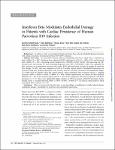Interferon Beta Modulates Endothelial Damage in Patients with Cardiac Persistence of Human Parvovirus B19 Infection
Schmidt-Lucke, Caroline
Spillmann, Frank
Bock, Thomas
Kühl, Uwe
Linthout, Sophie van
Schultheiss, Heinz-Peter
Tschöpe, Carsten
Background: In a phase 1 study, we investigated whether interferon beta reduced endothelial damage in patients with cardiac persistence of human parvovirus B19 (B19V) infection. Methods and results: In vitro, B19V infected cultivated endothelial cells (ECs), which led to a reduction in their viability (Pp.007). Interferon beta suppressed B19V replication by 63% (Pp.008) in ECs and increased their viability (Pp.021). Circulating mature apoptotic ECs (CMAECs [CD45-CD146+ cells expressing von Willebrand factor and annexin V]) and circulating progenitor cells (CPCs [CD34+KDR+ cells]) were quantified by flow cytometry in 9 symptomatic patients with cardiac B19V infection before and after 6 months of interferon beta therapy (16 MU) and were compared to levels in 9 healthy control subjects. Endothelial dysfunction was measured using flow-mediated dilatation of the forearm. Patients with B19V persistence had significantly higher (Pp.004) levels of CMAECs than did control subjects, which normalized after treatment (mean standard deviation, 0.06%-0.08% vs 0.01%-0.006%; Pp.008). Similar improvement was shown for flow-mediated dilatation (Pp.04) in the treatment group only (Pp.017 for the comparison with untreated patients with B19V persistence [np5]). There were significantly higher numbers of CPCs in patients with B19V persistence before therapy (mean standard deviation, 0.04%-0.05% vs 0.01%-0.004%; Pp.02) than in control subjects, which normalized after treatment (Pp.03). Conclusion: Thus, we present (for the first time, to our knowledge) a modulation of virally induced chronic endothelial damage specifically, EC apoptosis and endothelial regeneration.
No license information

